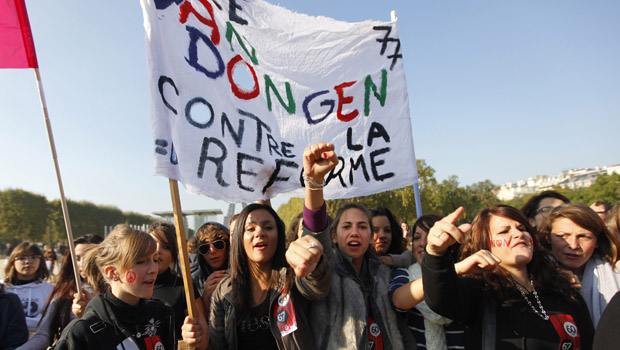Sarkozy’s government has weathered five one-day strikes since June against its plan to raise the retirement age, and analysts say the dispute may be nearing a cross-roads as unions attempt lengthier strikes and try for broader social support.
One student was injured when he was hit by a rubber flash-ball fired by police in the Paris suburbs, and another was taken to hospital in Bordeaux after clashes. In scuffles elsewhere, students in Lille burnt a car and rubbish containers.
With the protests affecting output from all but one of France’s 12 refineries, the government tried to quell fears of shortages, as a few dozen petrol stations ran out of supplies due to panic buying.
The FNTR haulage association said the government had authorized the use of some of its fuel reserves to ensure trucking firms were not hit.
“There will be no shortages of fuel at the pumps,” Transport Secretary Dominique Bussereau told LCI television. “We have what it takes for at least a month without any problems.” “I say to motorists, do not go and stock up on fuel, you will not need it,” Bussereau said.
Union leaders met in Paris to discuss whether to call a fresh 24-hour national strike next week, amid signs that support for the strike in the state-run rail sector, considered the bedrock of the protest, was flagging.
The SNCF state railways company said only 20 percent of its workers stayed away from work on Thursday, down from 25 percent on Wednesday and 40 percent on Tuesday. Almost all international trains and roughly half domestic ones were running normally.
With elections looming in early 2012, Sarkozy has stood firm on the flagship legislation, expected to be approved by the Senate within days, despite a 24-hour national protest on Tuesday which unions said brought 3.5 million onto the streets.
Unions have called for another nationwide march against the reforms on Saturday.
The government, which says 1.23 million marchers took to the streets on Tuesday, insists it will see through a reform needed to clean up its finances and retain France’s AAA credit rating.
However, a poll released on Thursday showed two-thirds of French people believe the sectoral stoppages could grow into a broad national protest movement that could paralyze the country as in 1995, when a 24-day strike crushed a pension overhaul.
The Internet survey of 1,016 people said some 54 percent of those questioned favored such a movement.
Refinery workers who walked off the job during Tuesday’s national strike continued to block fuel deliveries from nine of France’s 12 refineries and production slowed from seven.
With France’s top oil port of Fos-Lavera, near Marseilles, shut by demonstrators for an 18th day, the UFIP oil industry lobby has warned that localized fuel shortages could hit parts of France from the middle of next week.
France’s chemical industry association said the port blockage had already caused 550 million euros ($774.3 million) in losses.










